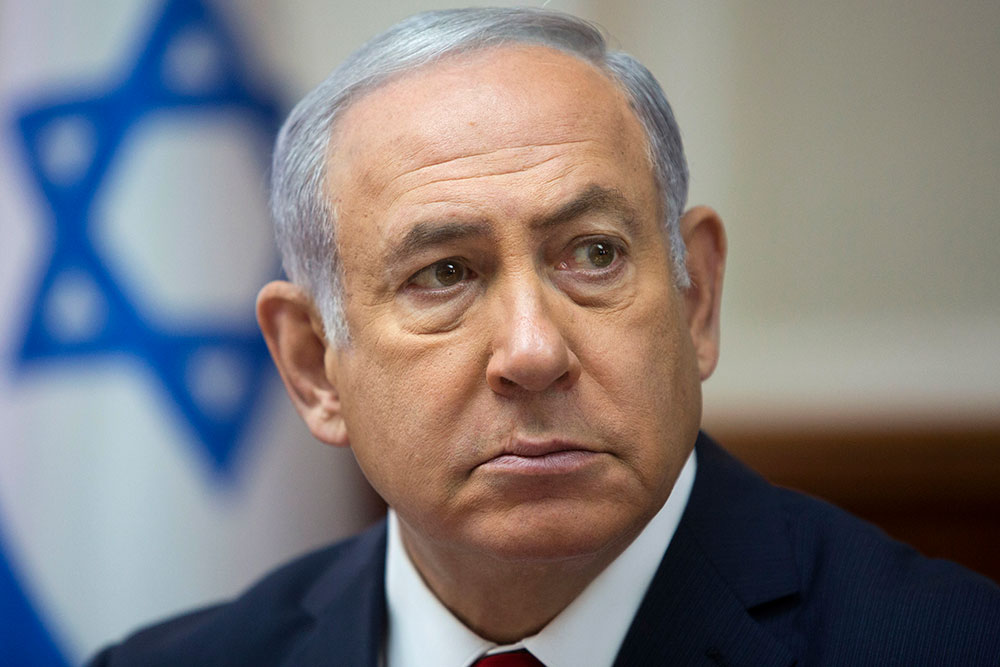The expected charges against Israeli Prime Minister Benjamin Netanyahu—bribery, fraud, and breach of trust—are also charges against large parts of the Israeli news industry. For an Israeli journalist like me, the 57-page document Israel’s Attorney General Avichai Mandelblit recently released is a first draft of a possible future indictment of Netanyahu as well as a sad but laser-sharp indictment of Israeli journalism.
In dry legal lingo, the attorney general tells a story of corruption. It is a story of a broken news industry, in which publishers are willing to sacrifice basic ethical principles and journalistic standards for business interests. Among the mountains of evidence the Israeli police have gathered over the past couple of years are numerous text messages between government officials and publishers demonstrating the latter’s willingness to comply with the prime minister’s wishes while fully conscious that their behavior was completely unethical and contradicted the core journalistic values of their own organizations. These publishers—but also managers and editors who went with the flow, reporters who didn’t ask why their stories were killed, colleagues who knew but didn’t say anything—were all accomplices.
Regardless of how the criminal charges end up, the Israeli news industry has a rare opportunity to uproot the corruption that has spread across it and start anew. In the age of fake news and declining public trust in the media, it is an opportunity the Israeli news industry must take.
Netanyahu potentially faces three criminal cases, but there is a common thread to all of them: Netanyahu’s behind-the-scenes efforts during the last decade to fortify his control over as many news organizations as he could. Netanyahu has repeatedly denied all charges against him. During a speech last week, after the attorney general's document was released, Netanyahu called it a "witch hunt" and accused the left and the media of trying to take him down.
Here are some of the facts, as the attorney general laid them out.
From 2015 to 2017, when Netanyahu served not only as Israel’s prime minister but also as minister of communications, the equivalent to the head of the U.S. Federal Communications Commission, he allegedly used his power in an unsuccessful bid to help his friend, Israeli Hollywood film producer Arnon Milchan, purchase one of Israel’s three TV broadcasters. Netanyahu sought, according to the attorney general, positive TV coverage; he also received cigars and champagne from Milchan worth about $135,000. The attorney general has issued no allegations of wrongdoing against Milchan.
In addition, Netanyahu faces allegations of attempting to conspire with one of Israel’s most powerful print publishers, Arnon Mozes, to undermine his biggest business rival, the pro-Netanyahu paper Israel Hayom, in exchange for positive coverage in Yedioth Ahronoth, the newspaper Mozes owns. Israel Hayom is owned and backed by American casino mogul Sheldon Adelson. Mozes denied offering a bribe to Netanyahu and said, through his lawyers, that he is certain that after presenting his side of the story, the attorney general will decide to drop the allegations.
Finally, Netanyahu allegedly acted to tilt regulation in favor of another friend, Israeli telecom mogul Shaul Elovitch, in exchange for positive coverage on Walla, the popular news website Elovitch owns. Elovitch's lawyers say they are studying the attorney general's claims and that they are certain Elovitch did nothing wrong.
To succeed in these efforts, Netanyahu needed partners from within the industry to play along. He didn’t have to work too hard to find them. Under growing financial pressure, some publishers, managers, editors, and journalists seemed eager to be of service.
This eagerness can be found in the text messages sent from Netanyahu’s staff (the prime minister himself doesn’t have a cell phone) to Elovitch, and from Elovitch to Walla executive Ilan Yeshua. The attorney general has issued no allegations of wrongdoing against Yeshua.
Two examples, quoted in the attorney general’s letter of charges, will suffice:
On January 17, 2013, in the midst of election season, Netanyahu asked Elovitch, through a mutual confidant, to have Walla run a negative story about the wife of one of his political rivals. Elovitch wrote in a text message to Yeshua: “The material I sent you this afternoon is highly important, especially the fact the wife worked as a cook for a non-kosher restaurant, although she is a religious woman. I’ve sent you her photo, the restaurant's name, and the non-kosher items on the menu.”
When Yeshua didn’t immediately publish, Netanyahu contacted Elovitch again, who, in turn, contacted Yeshua, who said the material would run on Sunday morning.
Elovitch: “Not good enough! He wants people to read it during the weekend. He’s shouting at me...”
Yeshua: “It will be at the top of the homepage in a few minutes.”
Elovitch: “Finally, unbelievable that ‘the Big One’ is waiting for hours and we can’t get it up.”
On March 11, 2015, shortly before a general election, Netanyahu gave a rare video interview to Walla. Disliking some of the questions he was asked, Netanyahu left the interview furious and immediately called Elovitch, demanding that the interview not be aired as is. Elovitch and Yeshua suggested Netanyahu and his aides edit the interview themselves. Netanyahu’s aide sent Yeshua instructions, including specific timecodes, to edit the interview. The interview aired the way Netanyahu wanted it.
Yeshua knew he was hurting his own organization’s credibility. “If I interfere too much with the [journalistic] work, one of the reporters will run and tell others … We can’t continue like this … The editors are furious … We’re on the brink of a mass resignation of senior editors. It will damage us colossally,” he wrote Elovitz on one occasion. “We cannot be perceived as Pravda,” he added on another.
How did we get to such grim times? Media companies all around the world have been struggling with growing financial pressure for at least a decade now. In Israel, a unique set of natural and political circumstances made this pressure even worse. When the market is big enough and healthy financially, the opportunity and incentive for corruption from within are small. Competing news organizations will gladly uncover each other’s wrongdoings. Editors and writers who feel censored can easily switch jobs. In Israel, though, this is not the case.
About five Hebrew daily newspapers compete for a market of roughly 300,000 to 500,000 readers. Most of these newspapers suffered tremendous losses over the past decade. The fact that one of these newspapers—Israel Hayom, funded by Adelson, one of Netanyahu’s major supporters—doesn’t seem to need to compete commercially makes things even more complicated.
Adelson established the paper in 2007 to increase support of Netanyahu and doesn’t seem concerned that it’s been losing money from the start. A free sheet, Israel Hayom has a daily circulation of 275,000 copies, making it one of the country’s two most read daily newspapers. According to Haaretz, the paper lost about $190 million between 2007 and 2014 and has continued to lose money. Adelson’s financial support for the paper means it can offer more competitive ad rates than its rivals, sending overall ad prices lower, putting even more pressure on other newspapers.
For decades, Mozes was used to being alone at the top of the industry. With the rise of Israel Hayom, he began to feel the pressure. According to the attorney general, “Netanyahu and Mozes reached an understanding that Mozes will turn Netanyahu’s coverage in his favor, and Netanyahu will make his friend Adelson stop growing his free newspaper’s circulation.”
The attorney general further alleges that “Mozes offered to establish a direct line between Netanyahu and his newspaper’s and website’s editors-in-chief, for the prime minister to be able to influence the content of specific stories. He also suggested hiring writers the prime minister will choose himself.” Although this deal wasn’t finalized, Netanyahu may face charges of breach of public trust for not turning it down, and Mozes could be charged with bribery.
Despite the attorney general’s report, Israeli journalists are doing an extraordinary job every day. They chase stories, unearth scandals, hold government and business officials accountable, and work around the clock to keep the Israeli public informed. Among other investigations, journalists have uncovered corruption in the defense industry and in banking.
We used to have a proud, free, powerful, and fair news industry. Many journalists still uphold these values. But others took the wrong path.
In a small and shrinking market such as Israel’s, where a handful of publishers have most of the market share, journalists know that their livelihoods sometimes depend on their willingness to be loyal. Sometimes it is more comfortable to look the other way, to convince oneself that these are small sacrifices to make for the greater good of staying in business and promoting the public interest. Journalists know that if they step up and get fired or resign in protest, they will probably face unemployment. No publisher wants a troublemaker in the newsroom. I’ve personally heard colleagues say,“We can be super righteous, but eventually we will go out of business and no one would be able to read our stories.” Under such circumstances, it is almost impossible to blame journalists who behave according to the new norm.
So I don’t blame Israeli journalists. It would be a lie to say I know exactly what I would do if I was in their shoes. I don’t. But I do think all of us in the Israeli news industry should regard this time as an opportunity to make changes and make amends to rebuild the industry’s credibility and the public’s trust.
The first and most important thing is not to ignore what happened but to publicly acknowledge that standards were trampled, ethical codes were trashed, norms were corrupted. Only after such public acknowledgment will the second necessary step be possible: to publicly pledge that it will never happen again—and to build the right mechanisms to ensure that. It is time for transparency in work practices, for mandating ombudsmen, for letting audiences know exactly how we mean to fix things.
There is no one right way to do this, and it would be presumptuous to prescribe a one-size-fits-all recipe for all Israeli news organizations. Every news organization will need to build its own best practices and ways to execute them. News organizations that don’t will rightfully suffer a further decline in public trust. It is time for journalism’s leadership to rise from the ashes, regroup, and lead the way. It’s the only way to make sure that the expected charges against Netanyahu don’t take down the entire Israeli news industry, too.
In dry legal lingo, the attorney general tells a story of corruption. It is a story of a broken news industry, in which publishers are willing to sacrifice basic ethical principles and journalistic standards for business interests. Among the mountains of evidence the Israeli police have gathered over the past couple of years are numerous text messages between government officials and publishers demonstrating the latter’s willingness to comply with the prime minister’s wishes while fully conscious that their behavior was completely unethical and contradicted the core journalistic values of their own organizations. These publishers—but also managers and editors who went with the flow, reporters who didn’t ask why their stories were killed, colleagues who knew but didn’t say anything—were all accomplices.
Regardless of how the criminal charges end up, the Israeli news industry has a rare opportunity to uproot the corruption that has spread across it and start anew. In the age of fake news and declining public trust in the media, it is an opportunity the Israeli news industry must take.
Netanyahu potentially faces three criminal cases, but there is a common thread to all of them: Netanyahu’s behind-the-scenes efforts during the last decade to fortify his control over as many news organizations as he could. Netanyahu has repeatedly denied all charges against him. During a speech last week, after the attorney general's document was released, Netanyahu called it a "witch hunt" and accused the left and the media of trying to take him down.
Here are some of the facts, as the attorney general laid them out.
From 2015 to 2017, when Netanyahu served not only as Israel’s prime minister but also as minister of communications, the equivalent to the head of the U.S. Federal Communications Commission, he allegedly used his power in an unsuccessful bid to help his friend, Israeli Hollywood film producer Arnon Milchan, purchase one of Israel’s three TV broadcasters. Netanyahu sought, according to the attorney general, positive TV coverage; he also received cigars and champagne from Milchan worth about $135,000. The attorney general has issued no allegations of wrongdoing against Milchan.
In addition, Netanyahu faces allegations of attempting to conspire with one of Israel’s most powerful print publishers, Arnon Mozes, to undermine his biggest business rival, the pro-Netanyahu paper Israel Hayom, in exchange for positive coverage in Yedioth Ahronoth, the newspaper Mozes owns. Israel Hayom is owned and backed by American casino mogul Sheldon Adelson. Mozes denied offering a bribe to Netanyahu and said, through his lawyers, that he is certain that after presenting his side of the story, the attorney general will decide to drop the allegations.
Finally, Netanyahu allegedly acted to tilt regulation in favor of another friend, Israeli telecom mogul Shaul Elovitch, in exchange for positive coverage on Walla, the popular news website Elovitch owns. Elovitch's lawyers say they are studying the attorney general's claims and that they are certain Elovitch did nothing wrong.
To succeed in these efforts, Netanyahu needed partners from within the industry to play along. He didn’t have to work too hard to find them. Under growing financial pressure, some publishers, managers, editors, and journalists seemed eager to be of service.
This eagerness can be found in the text messages sent from Netanyahu’s staff (the prime minister himself doesn’t have a cell phone) to Elovitch, and from Elovitch to Walla executive Ilan Yeshua. The attorney general has issued no allegations of wrongdoing against Yeshua.
Two examples, quoted in the attorney general’s letter of charges, will suffice:
On January 17, 2013, in the midst of election season, Netanyahu asked Elovitch, through a mutual confidant, to have Walla run a negative story about the wife of one of his political rivals. Elovitch wrote in a text message to Yeshua: “The material I sent you this afternoon is highly important, especially the fact the wife worked as a cook for a non-kosher restaurant, although she is a religious woman. I’ve sent you her photo, the restaurant's name, and the non-kosher items on the menu.”
When Yeshua didn’t immediately publish, Netanyahu contacted Elovitch again, who, in turn, contacted Yeshua, who said the material would run on Sunday morning.
Elovitch: “Not good enough! He wants people to read it during the weekend. He’s shouting at me...”
Yeshua: “It will be at the top of the homepage in a few minutes.”
Elovitch: “Finally, unbelievable that ‘the Big One’ is waiting for hours and we can’t get it up.”
On March 11, 2015, shortly before a general election, Netanyahu gave a rare video interview to Walla. Disliking some of the questions he was asked, Netanyahu left the interview furious and immediately called Elovitch, demanding that the interview not be aired as is. Elovitch and Yeshua suggested Netanyahu and his aides edit the interview themselves. Netanyahu’s aide sent Yeshua instructions, including specific timecodes, to edit the interview. The interview aired the way Netanyahu wanted it.
Yeshua knew he was hurting his own organization’s credibility. “If I interfere too much with the [journalistic] work, one of the reporters will run and tell others … We can’t continue like this … The editors are furious … We’re on the brink of a mass resignation of senior editors. It will damage us colossally,” he wrote Elovitz on one occasion. “We cannot be perceived as Pravda,” he added on another.
How did we get to such grim times? Media companies all around the world have been struggling with growing financial pressure for at least a decade now. In Israel, a unique set of natural and political circumstances made this pressure even worse. When the market is big enough and healthy financially, the opportunity and incentive for corruption from within are small. Competing news organizations will gladly uncover each other’s wrongdoings. Editors and writers who feel censored can easily switch jobs. In Israel, though, this is not the case.
About five Hebrew daily newspapers compete for a market of roughly 300,000 to 500,000 readers. Most of these newspapers suffered tremendous losses over the past decade. The fact that one of these newspapers—Israel Hayom, funded by Adelson, one of Netanyahu’s major supporters—doesn’t seem to need to compete commercially makes things even more complicated.
Adelson established the paper in 2007 to increase support of Netanyahu and doesn’t seem concerned that it’s been losing money from the start. A free sheet, Israel Hayom has a daily circulation of 275,000 copies, making it one of the country’s two most read daily newspapers. According to Haaretz, the paper lost about $190 million between 2007 and 2014 and has continued to lose money. Adelson’s financial support for the paper means it can offer more competitive ad rates than its rivals, sending overall ad prices lower, putting even more pressure on other newspapers.
For decades, Mozes was used to being alone at the top of the industry. With the rise of Israel Hayom, he began to feel the pressure. According to the attorney general, “Netanyahu and Mozes reached an understanding that Mozes will turn Netanyahu’s coverage in his favor, and Netanyahu will make his friend Adelson stop growing his free newspaper’s circulation.”
The attorney general further alleges that “Mozes offered to establish a direct line between Netanyahu and his newspaper’s and website’s editors-in-chief, for the prime minister to be able to influence the content of specific stories. He also suggested hiring writers the prime minister will choose himself.” Although this deal wasn’t finalized, Netanyahu may face charges of breach of public trust for not turning it down, and Mozes could be charged with bribery.
Despite the attorney general’s report, Israeli journalists are doing an extraordinary job every day. They chase stories, unearth scandals, hold government and business officials accountable, and work around the clock to keep the Israeli public informed. Among other investigations, journalists have uncovered corruption in the defense industry and in banking.
We used to have a proud, free, powerful, and fair news industry. Many journalists still uphold these values. But others took the wrong path.
In a small and shrinking market such as Israel’s, where a handful of publishers have most of the market share, journalists know that their livelihoods sometimes depend on their willingness to be loyal. Sometimes it is more comfortable to look the other way, to convince oneself that these are small sacrifices to make for the greater good of staying in business and promoting the public interest. Journalists know that if they step up and get fired or resign in protest, they will probably face unemployment. No publisher wants a troublemaker in the newsroom. I’ve personally heard colleagues say,“We can be super righteous, but eventually we will go out of business and no one would be able to read our stories.” Under such circumstances, it is almost impossible to blame journalists who behave according to the new norm.
So I don’t blame Israeli journalists. It would be a lie to say I know exactly what I would do if I was in their shoes. I don’t. But I do think all of us in the Israeli news industry should regard this time as an opportunity to make changes and make amends to rebuild the industry’s credibility and the public’s trust.
The first and most important thing is not to ignore what happened but to publicly acknowledge that standards were trampled, ethical codes were trashed, norms were corrupted. Only after such public acknowledgment will the second necessary step be possible: to publicly pledge that it will never happen again—and to build the right mechanisms to ensure that. It is time for transparency in work practices, for mandating ombudsmen, for letting audiences know exactly how we mean to fix things.
There is no one right way to do this, and it would be presumptuous to prescribe a one-size-fits-all recipe for all Israeli news organizations. Every news organization will need to build its own best practices and ways to execute them. News organizations that don’t will rightfully suffer a further decline in public trust. It is time for journalism’s leadership to rise from the ashes, regroup, and lead the way. It’s the only way to make sure that the expected charges against Netanyahu don’t take down the entire Israeli news industry, too.



